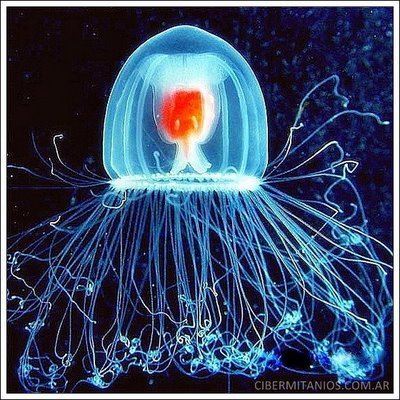 |
| Doesn't it look awesome? |
Commonly known as the "Immortal Jellyfish". Seriously, it's basically immortal. See normal jellyfish are born as a larva. This larva then develops into the unique jelly-baby we call a polyp. The polyp grows and grows until one day it reaches its final jellyfish state.
Turritopsis nutricula is a special little jelly though. As a fully grown medua (final jellyfish stage of life), it can actually "reverse age" back into the tiny polyp. That's like you suddenly reverting back into a baby; an ability I'm sure we'd all love to have.
But of course, in the real life of T. nutricula reverting back into a helpless polyp can be pretty dangerous. There's a higher chance that they will get eaten. But in exchange for basic immortality, not such a bad deal?
I find the topic of immortality quite an interesting one. We've been learning in a hell load of classes about immortality.
In a genetics class we've learned that Daf-2 mutants in C. elegans have almost twice the life span as normal worms. This gene is highly conserved in vertebrates... Daf-2 usually serves to inhibit the longevity of worms so is the same true for humans? Of course it'll be much more complicated, but this serves to confirm that longevity does lie in our genes.
 |
| The life of a regular non-immortal Jellyfish |
Turritopsis nutricula is a special little jelly though. As a fully grown medua (final jellyfish stage of life), it can actually "reverse age" back into the tiny polyp. That's like you suddenly reverting back into a baby; an ability I'm sure we'd all love to have.
But of course, in the real life of T. nutricula reverting back into a helpless polyp can be pretty dangerous. There's a higher chance that they will get eaten. But in exchange for basic immortality, not such a bad deal?
I find the topic of immortality quite an interesting one. We've been learning in a hell load of classes about immortality.
In a genetics class we've learned that Daf-2 mutants in C. elegans have almost twice the life span as normal worms. This gene is highly conserved in vertebrates... Daf-2 usually serves to inhibit the longevity of worms so is the same true for humans? Of course it'll be much more complicated, but this serves to confirm that longevity does lie in our genes.
Not that I think we have to worry, at the rate society's going at there are already selection pressures for women who reproduce later in life. I propose a century long study of human reproductive time selection!

No comments:
Post a Comment